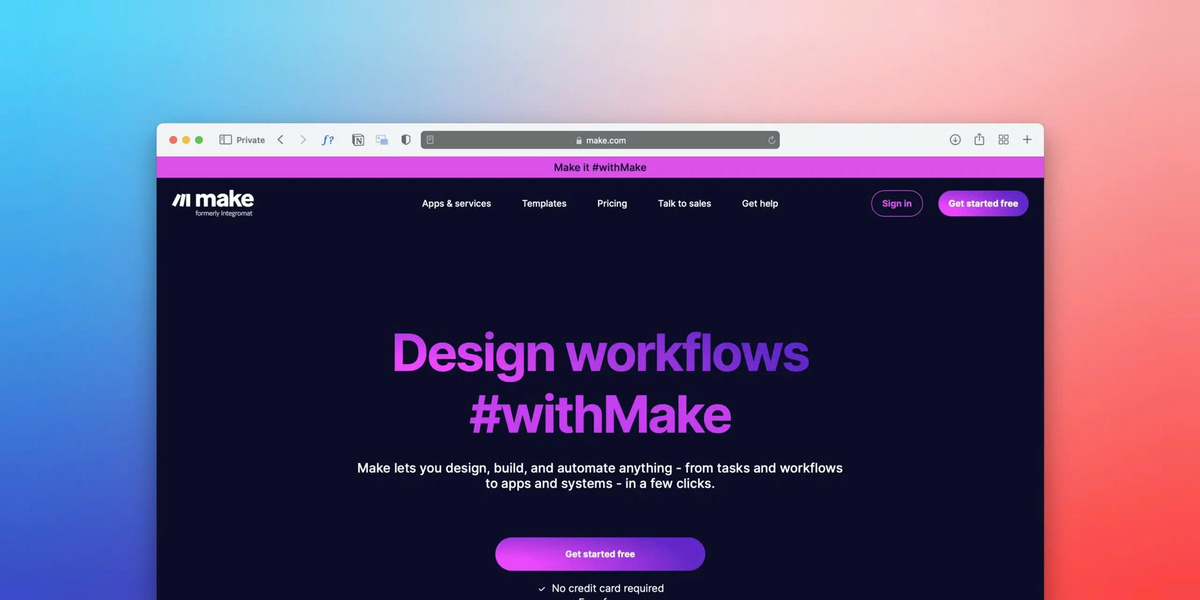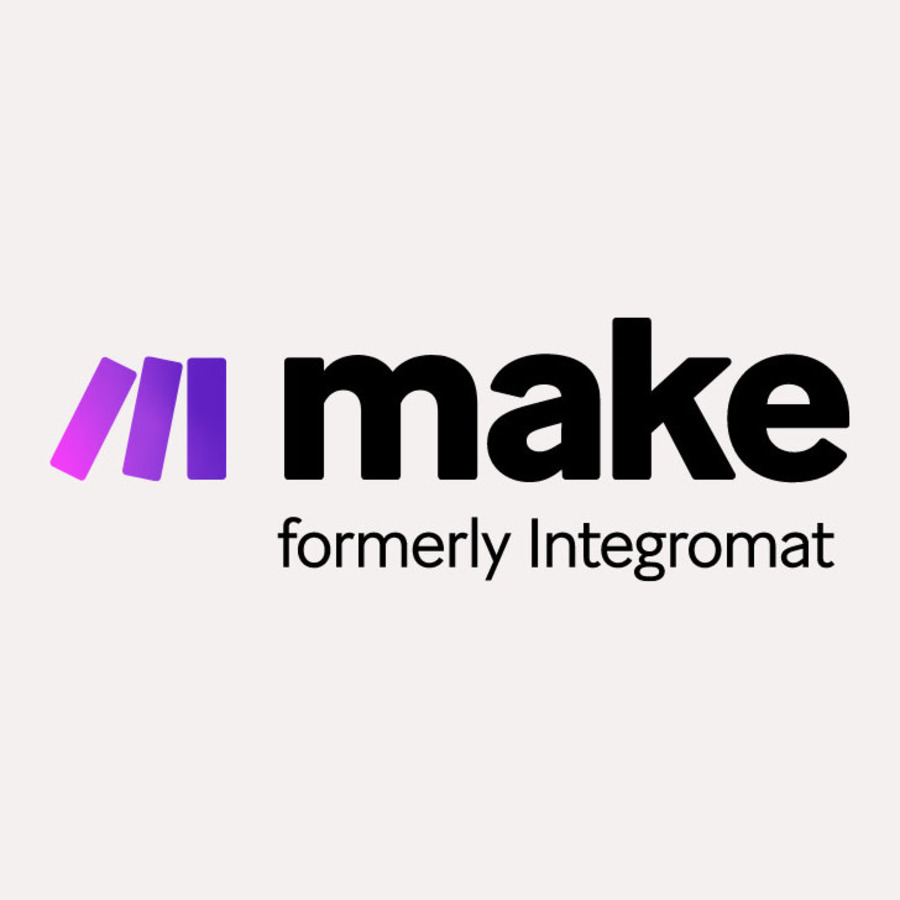In the digital age, automating work processes is becoming increasingly important for individuals, businesses and organizations. Automation can help save time, improve productivity, while reducing errors and increasing operational efficiency. One of the most powerful and flexible tools for workflow automation is Make and Integromat.
In this article, we will learn in detail about Make , Integromat and their features. From there, you will be able to apply automation solutions to your workflow, improving work efficiency and productivity.
I. Introduction Make

1. What is Make ?
Make (formerly Integromat) is a visual, code-free workflow automation platform. With an easy-to-use user interface, Make helps users connect and integrate different applications and services quickly and effectively.
Instead of having to write code to automate the process, users can simply drag and drop modules corresponding to the tasks to be performed into the workbench. After that, the modules will be connected together through triggers (conditions) and actions (actions), forming a complete workflow.
2. Outstanding advantages of Make
- Intuitive, easy-to-use interface : Make has an intuitive user interface, using drag and drop technology. Users do not need programming knowledge and can easily build complex workflows.
- Integrates more than 1,000 applications and services : Make allows connection to more than 1,000 popular applications and services such as Gmail, Google Sheets, Trello, Salesforce, Shopify, Slack, etc. This helps users to integrate familiar working tools for automating processes.
- Highly customizable : In addition to integrating with existing applications, Make also supports custom API integration. This allows users to connect to any application or service with an API, expanding automation capabilities.
- Powerful data processing features : Make provides powerful tools to filter, transform, and format data during process automation.
- Flexible scheduling and automation : Users can schedule workflows or trigger them on specific events.
- Extensibility and collaboration features : Make allows creating complex scenarios with many modules and conditions. In addition, users can also share and work in groups on workflows.
3. Objects using Make
Make is suitable for both individuals and businesses and organizations of all sizes:
- Personal : Individual users can use Make to automate personal processes like email management, calendar, tasks, etc.
- Small and Medium Businesses : Small and medium businesses can use Make to automate business processes like marketing, sales, customer support, project management, etc.
- Large Enterprises : Large enterprises can apply Make to automate complex internal processes, integrating disparate systems and applications.
II. How Make works
1. Build a working process
To automate the workflow with Make , users will build "scenarios" by connecting applications and services through modules.
Each module in Make represents a specific task, like sending emails, updating data into Google Sheets, creating notifications on Slack, etc. Users will drag and drop the necessary modules into the process map, then finish. Connect them together with triggers (conditions) and actions (actions).
For example, an automated process for sending new customer welcome emails would have the following modules:
- Trigger: When a new contact is added to CRM
- Action: Send a welcome email to new customers
- Action: Update customer information in Google Sheets
Modules will be connected to each other through triggers and actions, forming a complete process.
2. Schedule and trigger processes
In addition to connecting modules, users can also schedule workflows or trigger them according to specific events.
- Scheduling : Users can schedule workflows, such as sending marketing emails every Monday or updating data into Google Sheets at the end of each month.
- Event-triggered : Users can associate processes with certain events, such as when a new contact is added to CRM, when there is a new transaction on the website, etc. out, the process will be activated automatically.
Scheduling and triggering processes by events helps users save time and ensure jobs are performed regularly and on time.
III. Main features of Make
1. Visual process builder
One of Make 's standout features is its visual process builder based on drag and drop techniques. Users can easily build complex processes by dragging and dropping modules corresponding to the tasks to be performed into the process map.
Make 's intuitive and easy-to-use interface helps users without programming knowledge to create effective automation processes.
2. More than 1,000 integrated applications
Make allows connection to more than 1,000 popular applications and services such as Gmail, Google Sheets, Slack, Trello, Salesforce, Shopify, etc. Integrating familiar applications helps users easily apply Make into their workflow. current job.
The following table lists some of the applications that integrate with Make :
| Application | Application |
|---|---|
| Gmail | Salesforce |
| Google Sheets | Shopify |
| Trello | Dropbox |
| Slack | Microsoft 365 |
| Asana | Zoho CRM |
| Hubspot | Mailchimp |
Additionally, Make also supports custom API integration, allowing connection to any application or service that has an API.
3. Data processing tools
Make provides powerful tools to filter, transform, and format data during process automation. Some key data processing features include:
- Data filtering : Users can filter, sort, and remove unwanted data.
- Data transformation : Data can be transformed into different formats, like date conversion, structure change, etc.
- Data format : Data can be reformatted to suit other applications.
- Data calculations : Arithmetic operations can be performed on data.
These data processing tools help users customize and standardize data according to the needs of the automation process.
4. Scheduling and automation
Make allows users to schedule workflows or trigger them on specific events:
- Scheduling : Users can schedule workflows, such as sending marketing emails every Monday or updating data into Google Sheets at the end of each month.
- Event-triggered : Users can associate processes with certain events, such as when a new contact is added to CRM, when there is a new transaction on the website, etc. out, the process will be activated automatically.
Scheduling and event-driven process triggering helps ensure jobs are executed on time and automatically, saving users time and effort.
5. Scalability and collaboration features
Make provides extensibility and collaboration features to meet complex needs:
- Scalability : Users can create complex scenarios with multiple modules and conditions, allowing for the automation of complex workflows.
- Collaboration features : Users can share and work together across workflows. This is very useful when multiple people are involved in an automation process.
With its extensibility and collaboration features, Make becomes a powerful tool not only for individual users but also for large enterprises with complex automation needs.
IV. Make 's application
Make can be applied to many different fields to automate work processes. Here are some popular uses of Make :
1. Marketing automation
Make helps automate marketing activities such as sending marketing emails, managing contact lists, and analyzing marketing data. Users can build processes to effectively engage with customers and automate marketing campaigns.
2. Sales automation
Managing leads, tracking orders, creating sales reports are important sales tasks that Make can help automate. Connecting processes from lead generation to conversion will help improve sales performance and enhance customer experience.
3. Automate customer support
Managing tickets, answering frequently asked questions, sending surveys are customer support tasks that Make can automate. This helps businesses provide high-quality and fast customer service, strengthening relationships with customers.
4. Automate internal processes
Project management, work tracking, document approval are important activities in the internal processes of an organization. Make helps automate these processes, reducing the time and effort spent on managing and tracking daily tasks.
5. Application integration
Connecting different applications to exchange data and automate processes is one of the important applications of Make . Integrating applications helps optimize work processes, minimize information problems and increase work efficiency.
With its diverse and flexible applications, Make is an indispensable tool for automating efficient workflows.
V. Make pricing plans
Make offers flexible pricing plans to suit each user's needs:
1. Free
Make 's free plan is suitable for individual users and small businesses. This package provides basic features to start automating workflows.
2. Pay the fee
Make 's paid plans offer more advanced features and higher limits, suitable for businesses with more complex automation needs.
3. Customized package
For large businesses with complex needs, Make offers customized plans to meet unique requirements and ensure peak performance.
Choosing the right pricing plan helps users take full advantage of Make 's features without paying a lot of unnecessary costs.
BECAUSE. Alternatives Make
Besides Make , there are several other options for workflow automation:
1. Zapier
Zapier is a popular automation platform with many integrated apps. Zapier provides simple and flexible tools to automate workflows.
2. Automate.io
Automate.io is a simple and easy-to-use automation platform. Automate.io allows users to connect applications and create automated processes efficiently.
3. Tray.io
Tray.io is a powerful automation platform for businesses. Tray.io provides extensive tools and collaboration features to automate complex processes.
Choosing suitable alternatives helps users optimize workflow and improve work efficiency.
Conclude
Make is a powerful and flexible tool that helps users automate workflows and integrate applications with ease. With an intuitive interface, vast integrations, and highly customizable features, Make is a great choice for both individuals and businesses. Encourage users to experience Make to explore its automation potential. Provide contact and support information so users can get started using Make easily.









